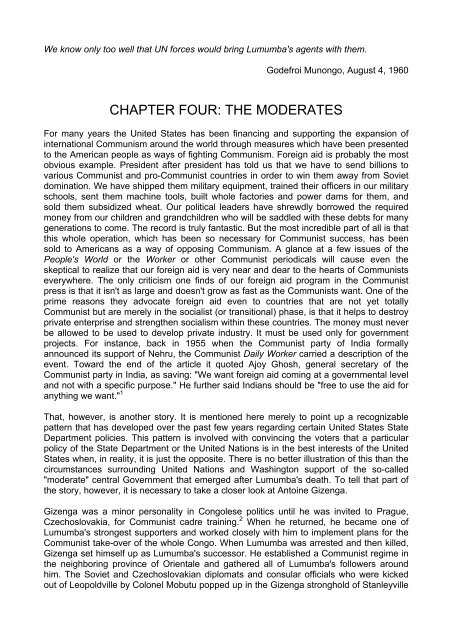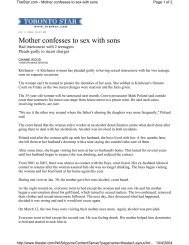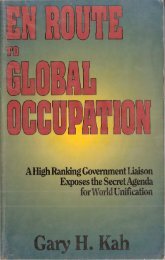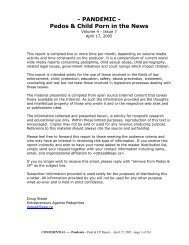G. Edward Griffin - The Fearful Master - PDF Archive
G. Edward Griffin - The Fearful Master - PDF Archive
G. Edward Griffin - The Fearful Master - PDF Archive
You also want an ePaper? Increase the reach of your titles
YUMPU automatically turns print PDFs into web optimized ePapers that Google loves.
We know only too well that UN forces would bring Lumumba's agents with them.<br />
Godefroi Munongo, August 4, 1960<br />
CHAPTER FOUR: THE MODERATES<br />
For many years the United States has been financing and supporting the expansion of<br />
international Communism around the world through measures which have been presented<br />
to the American people as ways of fighting Communism. Foreign aid is probably the most<br />
obvious example. President after president has told us that we have to send billions to<br />
various Communist and pro-Communist countries in order to win them away from Soviet<br />
domination. We have shipped them military equipment, trained their officers in our military<br />
schools, sent them machine tools, built whole factories and power dams for them, and<br />
sold them subsidized wheat. Our political leaders have shrewdly borrowed the required<br />
money from our children and grandchildren who will be saddled with these debts for many<br />
generations to come. <strong>The</strong> record is truly fantastic. But the most incredible part of all is that<br />
this whole operation, which has been so necessary for Communist success, has been<br />
sold to Americans as a way of opposing Communism. A glance at a few issues of the<br />
People's World or the Worker or other Communist periodicals will cause even the<br />
skeptical to realize that our foreign aid is very near and dear to the hearts of Communists<br />
everywhere. <strong>The</strong> only criticism one finds of our foreign aid program in the Communist<br />
press is that it isn't as large and doesn't grow as fast as the Communists want. One of the<br />
prime reasons they advocate foreign aid even to countries that are not yet totally<br />
Communist but are merely in the socialist (or transitional) phase, is that it helps to destroy<br />
private enterprise and strengthen socialism within these countries. <strong>The</strong> money must never<br />
be allowed to be used to develop private industry. It must be used only for government<br />
projects. For instance, back in 1955 when the Communist party of India formally<br />
announced its support of Nehru, the Communist Daily Worker carried a description of the<br />
event. Toward the end of the article it quoted Ajoy Ghosh, general secretary of the<br />
Communist party in India, as saving: "We want foreign aid coming at a governmental level<br />
and not with a specific purpose." He further said Indians should be "free to use the aid for<br />
anything we want." 1<br />
That, however, is another story. It is mentioned here merely to point up a recognizable<br />
pattern that has developed over the past few years regarding certain United States State<br />
Department policies. This pattern is involved with convincing the voters that a particular<br />
policy of the State Department or the United Nations is in the best interests of the United<br />
States when, in reality, it is just the opposite. <strong>The</strong>re is no better illustration of this than the<br />
circumstances surrounding United Nations and Washington support of the so-called<br />
"moderate" central Government that emerged after Lumumba's death. To tell that part of<br />
the story, however, it is necessary to take a closer look at Antoine Gizenga.<br />
Gizenga was a minor personality in Congolese politics until he was invited to Prague,<br />
Czechoslovakia, for Communist cadre training. 2 When he returned, he became one of<br />
Lumumba's strongest supporters and worked closely with him to implement plans for the<br />
Communist take-over of the whole Congo. When Lumumba was arrested and then killed,<br />
Gizenga set himself up as Lumumba's successor. He established a Communist regime in<br />
the neighboring province of Orientale and gathered all of Lumumba's followers around<br />
him. <strong>The</strong> Soviet and Czechoslovakian diplomats and consular officials who were kicked<br />
out of Leopoldville by Colonel Mobutu popped up in the Gizenga stronghold of Stanleyville



![Robert T McQuaid [rtmq@stn.net] Sent: Friday, October 29, 2004 12 ...](https://img.yumpu.com/51070071/1/190x245/robert-t-mcquaid-rtmqstnnet-sent-friday-october-29-2004-12-.jpg?quality=85)







